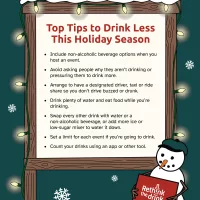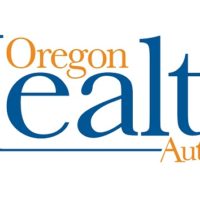
Four state agencies are teaming up this holiday season to support the Rethink the Drink winter advertising campaign that encourages people in Oregon to celebrate safely by understanding the health and social harms of excessive alcohol use.
Officials at the Oregon Alcohol and Drug Policy Commission, Oregon Liquor and Cannabis Commission, Oregon Department of Transportation and Oregon Health Authority hope the tools provided by the campaign help people reduce the pressure to drink alcohol during family gatherings or holiday parties.
“In these environments, it’s easy to drink more than you normally might,” said Tom Jeanne, M.D., M.P.H., deputy state health officer and deputy state epidemiologist at OHA. “We can all support one another to drink less, and that includes having healthy and honest conversations about our alcohol use.”
Each year, more than 2,500 people in Oregon die from alcohol-related causes, including cancers, heart disease, liver disease, violence and vehicle crashes. Excessive alcohol use is the third leading cause of preventable death in Oregon.
“The holiday season is the perfect opportunity to show support for loved ones who are working to avoid excessive alcohol use,” said ADPC Director Annaliese Dolph. “It is a great time to encourage healthy choices. The journey to wellness requires rethinking our relationships with different substances, and it requires the love and support of our communities.”
Holiday events and binge drinking sometimes go hand in hand. That can contribute to unsafe driving and other dangerous behavior. Binge drinking impairs judgment, slows reaction times and increases the likelihood of making fatal decisions.
“Preventing impaired driving is a shared responsibility, and each of us can do our part to make sure our celebrations don’t put others at risk,” said Ryan Stone, Impaired Driving Program manager for ODOT’s Transportation Safety Office. “By planning ahead—whether that’s designating a sober driver, arranging a rideshare, using public transportation, or supporting friends who choose to drink to get home safely—we can help keep our roads safe. Let’s make this season one of joy and safety for all.”
The Centers for Disease Control and Prevention’s definition of excessive drinking includes both heavy drinking and binge drinking:
- Binge drinking is when a man has five or more standard drinks in one setting or occasion. For a woman, it’s four or more drinks.
- Heavy drinking, the kind that can harm your health in the long term, is 15 drinks or more a week for a man. For a woman, it’s eight or more drinks.
Binge drinking is the most common and costly form of excessive drinking, and it’s not just an issue for young people: people in their 30s and 40s binge drink at close to the same rates as younger people. But there are many things people can do this time of year to support friends and family to drink less.
“Not everyone drinks alcohol and not all drinkers want to drink only alcohol, so it’s good to have alternatives,” said Craig Prins, OLCC’s executive director. “If you’re hosting an event this holiday season, offer non-alcoholic beverage options and be sure to have food available for guests.”
In addition to offering non-alcoholic options during holiday events and encouraging people to arrange for a designated driver, rideshare or taxi, there are other ways people can keep themselves and others from drinking too much this holiday season:
- Avoid asking people why they aren’t drinking or pressuring them to drink more.
- Drink plenty of water and eat food while drinking alcohol.
- Consider swapping every other drink with water or a non-alcoholic beverage, or watering down a drink with ice or a low-sugar mixer.
- If you’re planning to drink, set a limit for that event.
- Count drinks when at an event or out with friends. Use an app to track drink consumption.
If you or someone you care about is suffering from alcohol dependence or an alcohol use disorder, free confidential resources and support are available online or by calling or 1-800-923-435.
Alcohol and Drug Policy Commission
The Alcohol and Drug Policy Commission (ADPC) is an independent state agency created by the Oregon Legislature to improve the effectiveness and efficiency of state and local substance use disorder (SUD) prevention, treatment and recovery services for all Oregonians. For more information, please visit https://www.oregon.gov/adpc/pages/index.aspx.
Oregon Liquor and Cannabis Commission
The Oregon Liquor and Cannabis Commission (OLCC) oversees access to alcohol and cannabis products in Oregon through education, regulation and distilled spirits distribution. Its aim is to protect public health and safety while supporting responsible businesses and providing funding for local and state agencies.
Oregon Department of Transportation
The Oregon Department of Transportation’s (ODOT) mission is to provide a safe and reliable multimodal transportation system that connects people and supports Oregon’s communities and economy. A key component of this mission is the Transportation Safety Office (TSO), which is dedicated to improving the safety of all roadway users and all modes of travel in Oregon through education and outreach.
Rethink the Drink
Rethink the Drink is an Oregon Health Authority (OHA) initiative to build healthier communities by decreasing excessive drinking and the harm it causes to individuals, families and communities. Rethink the Drink raises awareness of the effects of excessive alcohol use across Oregon. It aims to start conversations about alcohol’s role in people’s lives and communities. This initiative emphasizes health equity, noting that Black and American Indian communities, and those with lower incomes or education, face higher rates of alcohol-related harms due to systemic inequities. Rethink the Drink is committed to OHA’s larger goal of ending health inequities in Oregon by 2030.















